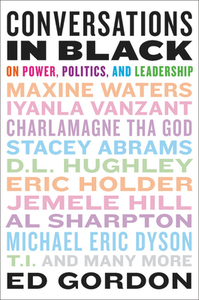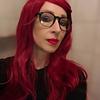You need to sign in or sign up before continuing.
Take a photo of a barcode or cover
toggling between a 4-5. i think this book should be read by everyone really. it’s really important. only qualm would be i would have loved to see some younger black voices in the conversation (millennials and gen-z) but honestly that would have to have been a whole other book i think.
i think the last seven chapters were absolutely amazing! and probably were my favorites our of the book.
i think the last seven chapters were absolutely amazing! and probably were my favorites our of the book.
“Conversations in Black” by @edlgordon features Black leaders discussing everything from police brutality to the economics of being Black to Madea.
I appreciated the range of Black voices in the book. It was nice to hear from familiar names (Maxine Waters, Alicia Garza, Jemele Hill) and engage with those that are new to me (Rev. William Barber, Jitu Brown, Brittney Cooper).
I was especially drawn in by reflections about Obama’s legacy, activism and voting, the economics of being Black, and Black representation in the media.
I was disappointed by the complete lack of discussion about LGBTQ+ issues in the Black community, especially the alarming epidemic of Black trans people being murdered.
Was this due to the inclusion of people who have made public homophobic remarks? (Charlamagne tha God, D.L. Hughley, T.I.)
While lively, the conversations in this book were often too restrained and polite for me.
However, this book is an accessible introduction to key concerns for the Black community. So it’s worth a read.
I appreciated the range of Black voices in the book. It was nice to hear from familiar names (Maxine Waters, Alicia Garza, Jemele Hill) and engage with those that are new to me (Rev. William Barber, Jitu Brown, Brittney Cooper).
I was especially drawn in by reflections about Obama’s legacy, activism and voting, the economics of being Black, and Black representation in the media.
I was disappointed by the complete lack of discussion about LGBTQ+ issues in the Black community, especially the alarming epidemic of Black trans people being murdered.
Was this due to the inclusion of people who have made public homophobic remarks? (Charlamagne tha God, D.L. Hughley, T.I.)
While lively, the conversations in this book were often too restrained and polite for me.
However, this book is an accessible introduction to key concerns for the Black community. So it’s worth a read.
challenging
informative
reflective
slow-paced
Excellent read. Great conversation. Certainly there are others who would have served as excellent contributors to this narrative but, the conversation was needed and is well done. I like that many viewpoints were showcased from various industries and generations. Well done.
I found the setup and organization of this book difficult to follow.
I could spend hours telling you all the lessons I learned from this collection of interviews. We could then spend months dissecting the proposed solutions and opinions, the generational gaps, the coloration exchanges, the highs and the lows of Black America. But I won’t. There are some books that need to speak for themselves and some conversations that need to happen organically because of them, and this is one of those books.
.
.
“No monolithic thought can be—or should be— reached by all African Americans in any subject. Our beliefs on how best to achieve the goal of equality are shaped by, among other things, our experiences, backgrounds, education, and social status. However, we can and should work toward building consensus.” ~Ed Gordon
.
.
If you have read it, let’s chat! If you have not read it and you are genuinely interested in being a solution to racial inequities, then this title should move to the forefront of your TBR.
.
.
#conversationsinblack #edgordan #blackreads #diversespines #nonfiction #blacklivesmatter #wellreadblackgirl #booksofig #ownvoices
.
.
“No monolithic thought can be—or should be— reached by all African Americans in any subject. Our beliefs on how best to achieve the goal of equality are shaped by, among other things, our experiences, backgrounds, education, and social status. However, we can and should work toward building consensus.” ~Ed Gordon
.
.
If you have read it, let’s chat! If you have not read it and you are genuinely interested in being a solution to racial inequities, then this title should move to the forefront of your TBR.
.
.
#conversationsinblack #edgordan #blackreads #diversespines #nonfiction #blacklivesmatter #wellreadblackgirl #booksofig #ownvoices
This is such an important book. Definitely will revisit in the future
hopeful
informative
inspiring
reflective
medium-paced
This is a fantastic book! The conversations are so insightful. What a privilege to be invited in. I already can’t wait to read this again.
Recently there was a flood in news, opinions, etc., about racism and how to think about it. I'm happy that our country is having this discourse and it's definitely overdue, by much more than 400 years. This book was a bit of fresh air because it recognizes that there are many viewpoints, and takes the time to express a few of them. Each chapter is dedicated to a topic and has like 5 or so celebrities, politicians, and activists providing their take on the subject. As a reader, some opinions appealed to me and some didn't do so as much, and that was OKAY because it was the whole point.
Read this book if you're looking to join the conversation but are still trying to figure out what you believe in a world where everybody else is telling you how to think.
Read this book if you're looking to join the conversation but are still trying to figure out what you believe in a world where everybody else is telling you how to think.
I love the idea of this book, but I'm not sure how well it played out. The conversations are more like disjointed quotes--you feel, reading them, that you're left out of most of the discussion. Also, I see a lot of what seems to this white outsider as blaming the victim. For example, in the discussion of representation in movies, there's a lot of talk about characters that black actors play or write or both that reflect stereotypes or reflect badly on black people as a whole. But isn't that the fault of a society that doesn't let black people be individuals? You don't see white people talking about how they shouldn't have made The Joker because that character reflects badly on white people. Just my two cents.
I really love the questions at the end of each chapter, and the diversity of voices that is included in the book. I especially liked the parts written by Ed Gordon.
I really love the questions at the end of each chapter, and the diversity of voices that is included in the book. I especially liked the parts written by Ed Gordon.






